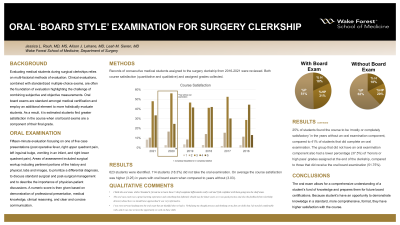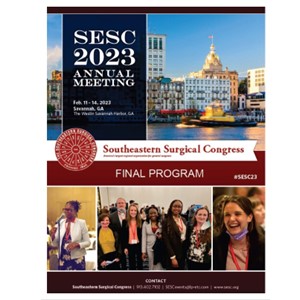Education
Category: Quickshot Oral Session 15
Quickshot Oral : Quickshot Oral Session 15
ORAL BOARD STYLE EXAMINATION FOR GENERAL SURGERY CLERKSHIP
Monday, February 13, 2023
7:00am - 8:00am East Coast USA Time

- JR
Jessica Rauh, MD, MS
United States
- JR
Jessica Rauh, MD, MS
United States
Presenter(s)
Principal Contact(s)
Objectives: Evaluating medical students during surgical clerkships relies on multi-factorial methods of evaluation. Clinical evaluations, combined with standardized multiple-choice exams, are often the foundation of evaluation highlighting the challenge of combining subjective and objective measurements. Oral board exams are standard amongst medical certification and employ an additional element to more holistically evaluate students. As a result, it is estimated students find greater satisfaction in the course when oral board exams are a component of their final grade.
Methods: Course evaluations from years that incorporated an oral board exam were compared to a year that omitted the exam. Evaluations are based on a scale of needs improvement to exceeds expectations. The quantitative scores were averaged amongst the clerkship participants and compared to their final grade in the course (Honors, High Pass, Pass, Fail). The qualitative data was also analyzed, paying particular attention to comments regarding the oral examination.
Results: When comparing years that included the oral exam to years without the oral exam, we found course satisfaction was higher in the years that included the oral exam compared (3.25 out of 5) to years without oral board exam (3.0 out of 5). Overall course grades and shelf exam scores were similar amongst the 2 groups.
Conclusion: The oral exam adds a novel element to evaluation of a medical student that allows for a comprehensive understanding of a student’s fund of knowledge and prepares them for future board certifications. Because student’s have an opportunity to demonstrate knowledge in a standard, more comprehensive, format, they have higher satisfaction with the course.
Methods: Course evaluations from years that incorporated an oral board exam were compared to a year that omitted the exam. Evaluations are based on a scale of needs improvement to exceeds expectations. The quantitative scores were averaged amongst the clerkship participants and compared to their final grade in the course (Honors, High Pass, Pass, Fail). The qualitative data was also analyzed, paying particular attention to comments regarding the oral examination.
Results: When comparing years that included the oral exam to years without the oral exam, we found course satisfaction was higher in the years that included the oral exam compared (3.25 out of 5) to years without oral board exam (3.0 out of 5). Overall course grades and shelf exam scores were similar amongst the 2 groups.
Conclusion: The oral exam adds a novel element to evaluation of a medical student that allows for a comprehensive understanding of a student’s fund of knowledge and prepares them for future board certifications. Because student’s have an opportunity to demonstrate knowledge in a standard, more comprehensive, format, they have higher satisfaction with the course.

